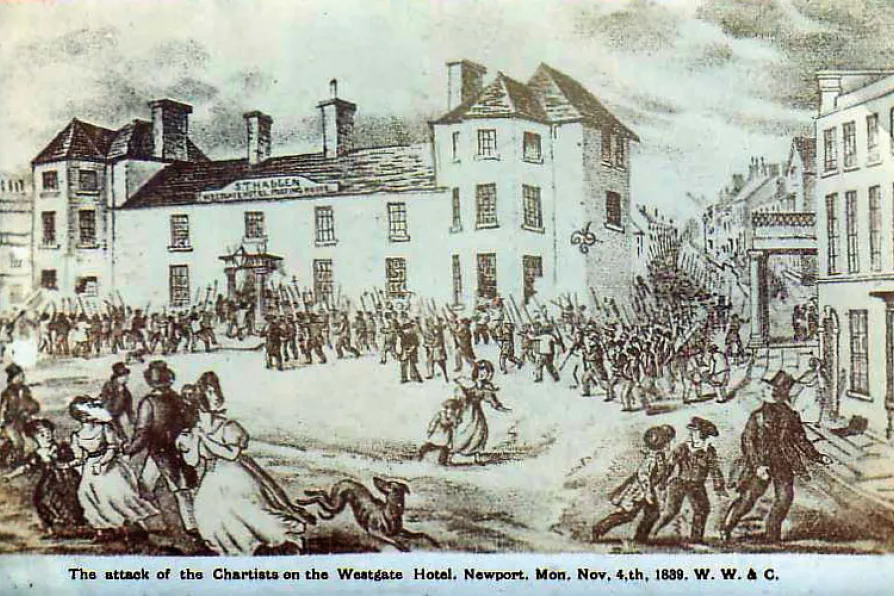This weekend, the NEU holds a special conference to debate changing its approach to organising teaching assistants, which a 2017 TUC agreement forbids. General secretary DANIEL KEBEDE outlines the choices before delegates
It’s not just the Starmer regime: the workers of Britain have always faced legal affronts on their right to assemble and dissent, and the Labour Party especially has meddled with our freedoms from its earliest days, writes KEITH FLETT

 PROTEST PIONEERS: The assault of the Chartists on the Westgate Hotel, where some of their comrades were held prisoner, Newport, 1839
PROTEST PIONEERS: The assault of the Chartists on the Westgate Hotel, where some of their comrades were held prisoner, Newport, 1839
THE 32nd march for Palestine in central London since October 2023 took place on October 11 2025 with over 500,000 people attending. The reaction of Labour ministers was that such marches must be curtailed, while Keir Starmer made vague references to banning undefined chants that he did not wish to hear.
The fundamental issue is that the marches raise the issue of the government’s complicity with genocide in Gaza, and the case is unanswerable. Arms sales to Israel continue, as do diplomatic and trade links.
Suggestions that this makes the current Labour government the most authoritarian ever suggests a certain lack of attention to history.
There is no question, however, that in “cracking down” — the favourite term of the moment — on protest, the current government is on a very similar page to previous Tory administrations. They wanted to “crack down” on environmental protesters, but the fundamental issue was to restrict any kind of democratic protest.
The Tories, of course, have a long history of this sort of thing.
One of the six Acts, which were actually formally passed in December 1819 after Peterloo, was the Seditious Meetings Act.
Under the Act, all meetings of more than 50 people — in reality, no more than 49 persons — were allowed. At such meetings, no banners, flags or emblems of any sort were allowed.
Another of the Acts, the Misdemeanours Act, reduced the opportunities for bail and sped up the process for sentencing. The Blasphemous and Seditious Libels Act, essentially aimed at any writing the government didn’t like, provided for a prison sentence of up to 14 years or transportation, while the Newspaper and Stamp Duties Act required publishers to post a bond which would be forfeited if they printed something the government deemed unacceptable.
Most of these laws were swept away in the decades that followed — but only by the organised pressure and campaigns of the early labour movement.
For those who know the history of the labour movement and from 1900 the Labour Party — which does not appear to include most members of the present government — it came from a very different place.
The Chartist and Suffragette fight for the vote and political rights included petitions and marches, but also direct action, general strikes, and in 1839, in Newport, an attempt at armed revolt. The current government, the partial inheritor of such traditions, now regards them as terrorism.
But since the first Labour government in 1924, the authoritarian mindset has been there.
The Clement Attlee government from 1945-50, rightly remembered for the creation of the NHS, was also keen on intervening in strikes of dockers, lorry drivers, gas workers and miners. In that five-year period, two states of emergency were declared to deal with industrial disputes. Troops were sent in to break strikes on 18 separate occasions.
A 2025 echo can be found in the Birmingham bin workers’ dispute, but the mindset had been there from the start. The first Labour government declared a state of emergency over a London bus workers’ strike.
Not just strikes but civil liberties have been in the frame. During the 1974-79 Labour government, two journalists and an informant were prosecuted under various sections of the then 1911 Official Secrets Acts. They had exposed CIA snooping in British politics. The Labour home secretary Merlyn Rees refused to intervene. While the defendants were found guilty, minimal penalties were imposed.
The history of modern Britain has been of the government trying to restrict protest and organising, and the labour movement and the left resisting this, often successfully. The resistance needs to continue.
Keith Flett is a socialist historian. Follow him on X @kmflett.

Who you ask and how you ask matter, as does why you are asking — the history of opinion polls shows they are as much about creating opinions as they are about recording them, writes socialist historian KEITH FLETT

The government cracking down on something it can’t comprehend and doesn’t want to engage with is a repeating pattern of history, says KEITH FLETT

KEITH FLETT traces how the ‘world’s most successful political party’ has imploded since Thatcher’s fall, from nine leaders in 30 years to losing all 16 English councils, with Reform UK symbolically capturing Peel’s birthplace, Tamworth — but the beast is not dead yet











